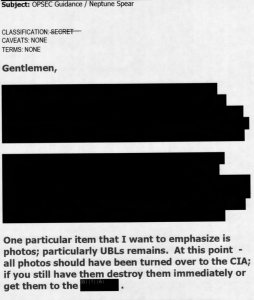In the parlance of the once and forever MTV set, civil libertarians just had one of the “Best Weeks Ever”. Here is the ACLU’s Catherine Crump weighing in on the surprising results of President Obama’s Review Board:
Friday, the president’s expressed willingness to consider ending the NSA’s collection of phone records, saying, “The question we’re going to have to ask is, can we accomplish the same goals that this program is intended to accomplish in ways that give the public more confidence that in fact the NSA is doing what it’s supposed to be doing?”
With this comment and the panel’s report coming on the heels of Monday’s remarkable federal court ruling that the bulk collection of telephone records is likely unconstitutional, this has been the best week in a long time for Americans’ privacy rights.
That “federal court ruling” is, of course, that of Judge Richard Leon handed down a mere five days ago on Monday. Catherine is right, it has been a hell of a good week.
But lest we grow too enamored of our still vaporous success, keep in mind Judge Leon’s decision, as right on the merits as it may be, and is, is still a rather adventurous and activist decision for a District level judge, and will almost certainly be pared back to some extent on appeal, even if some substantive parts of it are upheld. We shall see.
But the other cold water thrown came from Obama himself when he gave a slippery and disingenuous press conference Friday. Here is the New York Times this morning capturing spot on the worthless lip service Barack Obama gave surveillance reform yesterday:
By the time President Obama gave his news conference on Friday, there was really only one course to take on surveillance policy from an ethical, moral, constitutional and even political point of view. And that was to embrace the recommendations of his handpicked panel on government spying — and bills pending in Congress — to end the obvious excesses. He could have started by suspending the constitutionally questionable (and evidently pointless) collection of data on every phone call and email that Americans make.
He did not do any of that.
….
He kept returning to the idea that he might be willing to do more, but only to reassure the public “in light of the disclosures that have taken place.”
In other words, he never intended to make the changes that his panel, many lawmakers and others, including this page, have advocated to correct the flaws in the government’s surveillance policy had they not been revealed by Edward Snowden’s leaks.
And that is why any actions that Mr. Obama may announce next month would certainly not be adequate. Congress has to rewrite the relevant passage in the Patriot Act that George W. Bush and then Mr. Obama claimed — in secret — as the justification for the data vacuuming.
Precisely. The NYT comes out and calls the dog a dog. If you read between the lines of this Ken Dilanian report at the LA Times, you get the same preview of the nothingburger President Obama is cooking up over the holidays. As Ken more directly said in his tweet, “Obama poised to reject panel proposals on 702 and national security letters.” Yes, indeed, count on it.
Which brings us to that which begets the title of this post: I Con The Record has made a Saturday before Christmas news dump. And a rather significant one to boot. Apparently because they were too cowardly to even do it in a Friday news dump. Which is par for the course of the Obama Administration, James Clapper and the American Intel Shop. Their raison de’etre appears to be keep America uninformed, terrorized and supplicant to their power grabs. Only a big time operator like Big Bad Terror Voodoo Daddy Clapper can keep us chilluns safe!
So, the dump today is HERE in all its glory. From the PR portion of the “I Con” Tumblr post, they start off with Bush/Cheney Administration starting the “bulk” dragnet on October 4, 2001. Bet that is when it first was formalized, but the actual genesis was oh, maybe, September 12 or so. Remember, there were security daddies agitating for this long before September 11th.
Then the handcrafted Intel spin goes on to say this:
Over time, the presidentially-authorized activities transitioned to the authority of the Foreign Intelligence Surveillance Act (“FISA”). The collection of communications content pursuant to presidential authorization ended in January 2007 when the U.S. Government transitioned the TSP to the authority of the FISA and under the orders of the Foreign Intelligence Surveillance Court (“FISC”). In August 2007, Congress enacted the Protect America Act (“PAA”) as a temporary measure. The PAA, which expired in February 2008, was replaced by the FISA Amendments Act of 2008, which was enacted in July 2008 and remains in effect. Today, content collection is conducted pursuant to section 702 of FISA. The metadata activities also were transitioned to orders of the FISC. The bulk collection of telephony metadata transitioned to the authority of the FISA in May 2006 and is collected pursuant to section 501 of FISA. The bulk collection of Internet metadata was transitioned to the authority of the FISA in July 2004 and was collected pursuant to section 402 of FISA. In December 2011, the U.S. Government decided to not seek reauthorization of the bulk collection of Internet metadata.
After President Bush acknowledged the TSP in December 2005, two still-pending suits were filed in the Northern District of California against the United States and U.S. Government officials challenging alleged NSA activities authorized by President Bush after 9/11. In response the U.S. Government, through classified and unclassified declarations by the DNI and NSA, asserted the state secrets privilege and the DNI’s authority under the National Security Act to protect intelligence sources and methods. Following the unauthorized and unlawful release of classified information about the Section 215 and Section 702 programs in June 2013, the Court directed the U.S. Government to explain the impact of declassification decisions since June 2013 on the national security issues in the case, as reflected in the U.S. Government’s state secrets privilege assertion. The Court also ordered the U.S. Government to review for declassification all prior classified state secrets privilege and sources and methods declarations in the litigation, and to file redacted, unclassified versions of those documents with the Court.
This is merely an antiseptic version of the timeline of lies that has been relentlessly exposed by Marcy Wheeler right here on this blog, among other places. What is not included in the antiseptic, sandpapered spin is that the program was untethered from law completely and then “transitioned” to FISC after being exposed as such.
Oh, and lest anybody think this sudden disclosure today is out of the goodness of Clapper and Obama’s hearts, it is not. As Trevor Timm of EFF notes, most all of the “I Con” releases have been made only after being forced to by relevant FOIA and other court victories and that this one in particular is mostly germinated by EFF’s court order (and Vaughn index) obtained.
So, with that, behold the “I Con” release of ten different declarations previously filed and extant under seal in the Jewel and Shubert cases. Much of the language in all is similar template affidavit language, which you expect from such filings if you have ever dealt with them. As for individual dissection, I will leave that for later and for discussion by all in comments.
The one common theme that I can discern from a scan of a couple of note is that there is no reason in the world minimally redacted versions such as these could not have been made public from the outset. No reason save for the conclusion that to do so would have been embarrassing to the Article II Executive Branch and would have lent credence to American citizens properly trying to exercise and protect their rights in the face of a lawless and constitutionally infirm assault by their own government. The declarations by Mike McConnell, James Clapper, Keith Alexander, Dennis Blair, Frances Fleisch and Deborah Bonanni display a level of too cute by a half duplicity that ought be grounds for sanctions.
The record has been conned. Our federal courts have been conned. All as the Snowden disclosures have proven. And the American people have been defrauded by pompous terror mongers who value their own and institutional power over truth and honesty to those they serve. Clapper, Alexander and Obama have the temerity to call Ed Snowden a traitor? Please, look in the mirror boys.
Lastly, and again as Trevor Timm pointed out above, these are just the declarations for cases the EFF and others are still pursuing. What of the false secret declarations made in al-Haramain v. Obama, which the government long ago admitted were bogus? Why won’t the cons behind “I Con” release those declarations? What about the frauds perpetrated in Mohamed v. Jeppesen that have fraudulently ingrained states secrets cons into the government arsenal?
If the government wants to come clean, here is the opportunity. Frauds have been perpetrated on our courts, in our name. We should hear about that. Unless, of course, Obama and the “I Cons” are really nothing more than simple good old fashioned cons.
[By the way, Christmas is a giving season. If you have extra cheer to spread, our friends like Cindy Cohn, Trevor Timm, Hanni Fakhoury and Kurt Opsahl et al at EFF, and Ben Wizner, Alex Abdo, Catherine Crump et al at the ACLU all do remarkable work. Share your tax deductible love with them this season if you can. They make us all better off.]





